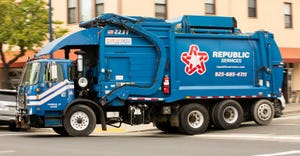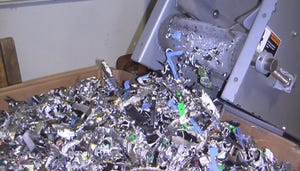Collection Managers Call The Shots
November 1, 1994
Bill Knapp
Too often, a municipal or private hauler gathers all the information, listens to the sales pitches and attends all the equipment shows, yet is more confused than illuminated. For example, manufacturers frequently are willing to give potential clients a list of referrals. But who's to say that the list includes the not-so-satisfied customers along with the happy ones? Something that works well in sunny Miami isn't necessarily as successful in rainy Seattle.
Every equipment manufacturer has unique features, different costs and persuasive arguments to convince you that its product suits your needs. Choosing among the diverse offerings for the waste industry is determined by each hauler's situation.
Many pundits believe that large cities and corporations are the innovators and pioneers of new concepts and technologies. However, the haulers featured in this article come from the other side of that equation. The ability to recognize the benefits of new ideas and the courage to innovate are a function of foresight and intelligence, not size.
City of Owensboro (Ky.) Sanitation Cissy Gregson, Superintendent
Located on the Ohio River banks, Owensboro is Kentucky's third largest city with a population of more than 54,000 residents. For a $9.00 monthly fee, the City Sanitation Department provides curbside residential collection service to more than 22,000 households. Since 1981, when all households were provided with a 90-gallon mobile container, residential refuse has been collected with a semi-automated cart system. We also collect yard waste, which is composted at a facility located within two miles of the city limits.
The Sanitation Department operates as a self-contained enterprise with a budget of $3,615,140. Over the past year, the department has been restructuring. The residential collection route system has changed from an eight-route, four-day week to a six-route, five-day week and commercial collection routes have been reduced from six routes to four.
We've reduced personnel from 53 to 39 people through attrition and transfers to other city departments. These improved operating procedures, along with Daviess County's construction of a convenient solid waste transfer station, have reduced the operating budget by 20 percent.
With a little help from the Sanitation Department, City Garage Superintendent Greg Nunn achieved his dream. He eliminated all of the department's junk trucks and, as a result, maintenance and parts inventory have been reduced and the fleet has been standardized to one truck brand. The department purchased 40-cubic-yard Mack/Leach tandem overheads equipped with joystick controls, as well as a rear-view TV backing system.
The residential collection fleet uses 31-cubic-yard Mack/Leach rear loaders with two flippers. A five-year replacement schedule has been initiated on all trucks to take advantage of a high resale value. For future purchases, the city is considering Allison's World-Series transmissions, V-Mack electronic engines and ABS braking systems.
The new trucks and added safety features have reduced accidents and increased employee safety awareness. For instance, the rearview system has more than paid for itself by reducing accidents on commercial collection routes. Sanitation employees were recently awarded with a steak dinner for achieving one year with no lost time due to injuries.
A variable rate system has been studied and is presently on hold until the testing of a cart-weighing system by Advance Data Acquisition and Management Systems (developed by Zarn and Hardy Instruments) is completed in the spring of 1995.
Our fleet is equipped with the General Electric EDACS 800 Truck System, which is capable of data and voice transmission. The system scans the code on the collection container, identifies the customer, weighs the contents and transmits the data, which is downloaded to the mainframe computer. This data is then integrated into the current billing system.
Owensboro is conducting a pilot blue bag recycling program in conjunction with Daviess County Fiscal Court. To avoid the cost of separate trucks and crews, we are exploring all possibilities that allow us to use our existing fleet. If the commingled collection program succeeds, the city will offer community-wide curbside service and eliminate the current recycling drop-off sites.
City of Mesa, Ariz. Jack Friedline, Solid Waste and Facilities Director
The city of Mesa provides solid waste management services to a population of more than 325,000 within 125 square miles. City employees provide automated side-loader service and bulk-item collection to approximately 70,000 residences. The city competes with private haulers for commercial collection, which is typically metal bin pickup (2-, 3-, 4-, 6- and 8-cubic-yard bins and roll-off boxes/compactors). The current operating budget is $17 million and includes the city's recycling program as well as other waste minimization efforts.
My greatest concerns have been developing collection vehicle specifications for high efficiency and effectiveness and meeting regulatory restrictions on weight formulas. In the past, the city has used the "bigger is better" approach in procuring more trucks: If a truck had higher compaction levels and a larger packer body, collection could be done with fewer trips to the landfill and was, therefore, more efficient. However, the bridge formula weights concept has changed our opinion. We now attempt to formulate an efficient vehicle specification within the parameters of compaction ratio, packer size, axle configurations and the required bridge formula weights.
To date, we have not considered compartmentalized packers for commercial collection and believe that, when Mesa begins to use transfer stations, a certain amount of separation can be done within the facility. Adding recyclables-only bins (i.e. cardboard) can be done efficiently with enough routing densities. Separate collection routes can accomplish this just as easily as split-compartment packer bodies.
One area we'll be looking into with greater interest is light-weight packer body configurations. We plan to analyze long-term maintenance costs in comparison to heavy-duty packer bodies.
It's a challenge for us to match our customers' desire to recycle with their concern over rate increases. We have adopted the "Blue Barrel" recycling program in which commingled recyclables are collected with an automated system and delivered to material recovery facilities (MRFs) for sorting and processing to the market.
To date, this program has reduced the weight of the residential solid waste stream by 20 percent. This is a good start toward our goal of maximizing waste diversion from our garbage pickup routes, fulfilling our residents' desires and extending the life of our local landfill.
The expansion of the Blue Barrel program throughout Arizona in the last two years has caused concern among public sector managers. To continue recycling programs like ours, MRF capacity needs to be available.
As solid waste managers, we all have common concerns and challenges to overcome. Although, at a generic level, these problems seem easily solved, even the most subtle differences in geography or operations must be addressed to formulate solutions.
Throughout my more than 20 years of public service, much of which has focused on municipal solid waste management, I have taken great pleasure in sharing ideas and discussing problems with other managers. Their insight helps me analyze and develop my own solutions.
Palo Alto (Calif.) Sanitation Co. Paul W. Madsen, Jr., Manager
I have worked for Palo Alto Sanitation Co. (PASCO) since August of 1958. After successfully bidding the initial renewal contract for the city in 1961, I bought the company.
We operate nine residential routes, nine commercial routes, four roll-off routes and six recycling routes. While most of our routes are level or have gentle hills, one route extends 13 miles and climbs 4,000 feet. In October, we started hauling the refuse to a transfer station about 10 miles south before it went to the landfill about 40 miles away.
We collect garbage from backyards and compostable yard wastes from the curbside of approximately 17,000 single-family homes. Since 1988, all of our trucks have been front-loaders. Four of our recycling trucks are non-packing and the other two are single-sectioned packer front-loaders designed for corrugated paper collection and other paper products.
While our backyard garbage collection service may be judged less than "state-of-the-art" by our industry, that point of view is from a cost standpoint rather than a customer preference point. Our vehicle body is a Dempster front-loader refuse packer with a blade follower attached to a half-height packing blade body-mounted on a low-entry, two-side driver Crane Carrier chassis with rear folding doors.
The units are equipped with a loading hopper of 3.5 cubic yards with two loading flippers mounted at the front, to flip garbage from our barrels on wheels into the hopper. We collect from both sides of the street because the backyard service makes this practice effective. This service also allows the same workers to collect a second load of yard waste at curbside, which is composted, not landfilled.
We have poor facilities for maintenance, but our maintenance program is thorough and effective using outside services for major welding and fabrication work. The city is our landlord and has not remedied our outdoor maintenance or cramped office problems, but they claim this will change soon.
The city owns and operates all utilities, including water, gas, electric and, until last October, the municipal landfill. It only lacks the refuse collection and recycling operations, which it contracts out to us. Two-thirds of the refuse collection revenues come from commercial-industrial customers.
When I started working at PASCO, the city took approximately 25 percent of gross billings for landfill services. Now they take 71 percent of much higher prices to pay for landfilling, transfer station services, street sweeping, hazardous waste drop-off reception and other public services.
This industry's work is labor-intensive and demands thorough training. We attempt to buy the best equipment and protect our investments with our training and recognition plans. Entry-level personnel are trained as standbys for every driving position in the company and they work in support positions in every department. Driving laws and qualifications are enforced more stringently now than a few years ago. Continuous training and coaching are necessary to keep qualified, licensed drivers on board.
Maintaining high safety standards is of utmost importance at PASCO. We invest heavily in safety to keep our priorities in line. We purchase back-up cameras for all one-person vehicles and other support equipment that will help the driver maintain safety. Strict backing procedures must be followed in all two- man vehicles. Efficiency of equipment and procedures must take second place to safety considerations in every aspect of operations - it's just good business.
Standardization within our industry may have a few benefits, but it stifles the imagination and the dynamics of being human. My advice is, instead of asking, "Why?", ask, "Why not?" before rejecting alternative ideas.
City of Plano, Texas Larry Page, Solid Waste Operations Supervisor
Just north of Dallas lies the innovative city of Plano. Its population of 165,000 includes 44,500 single-family residences and is growing at a rate of approximately 200 new residents per month. The city's Solid Waste Department takes pride in providing its residents with the best solid waste collection service available.
Prior to January 1991, our solid waste collection system consisted of throwing garbage bags into 29-cubic-yard side loaders. During January and February 1991, we delivered 40,000 95-gallon Otto refuse carts to the single-family residences. Each vehicle of the fleet was retro-fitted with two lifters which were replaced in 1992 with the A.R.E. Side Lifter to reduce the cost of maintenance and improve the productivity of one-man refuse collection routes.
The productivity goal for each route was established at 600 homes per route per eight-hour day and was eventually increased to 750 homes per 10-hour day to coincide with a change in our work-week schedule. To enable the one-man route to meet this goal, we changed the specifications for the refuse collection vehicle.
Modifications included a low-entry stand-up drive for both sides of the truck with a 25-yard packer unit and a 750-pound-per-ton compaction ratio. Each packing unit was equipped with two side lifters. This collection vehicle has allowed the route driver to service between 750 and 850 homes per 10-hour day, more than satisfying the department's goal.
The next step in Plano's solid waste master plan is to convert all semi-automated refuse collection vehicles to an automated system. The conversion will begin sometime this month. Four automated systems are presently being considered: Heil Rapid Rail, Wayne, Bridgeport and Maxon. The automated system will be mounted on a Crane Carrier low-entry, sit-down drive on both sides.
The driver will operate the automated system from the right side using three cameras and a single monitor. These cameras will allow the driver to service the 95-gallon cart by viewing the monitor in the cab and not actually looking directly at the cart. Servicing the carts from the right side, using a low-entry cab, will enable the driver to pick up any extra items located outside of the carts, especially following major holidays.
Over the past four years, the City of Plano Solid Waste Department has modified its refuse collection vehicle fleet to take advantage of the changing technology available in the industry. In doing so, we have been able to maintain a high level of customer service, increase productivity standards and reduce work-related injuries.
You May Also Like


